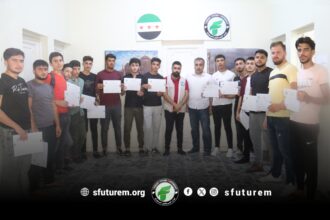Sustainable Development: A Syrian Necessity

Introduction:
Sustainable development is defined as a process aimed at meeting the needs of the present without compromising the ability of future generations to meet their own needs. It involves achieving a balance between economic growth, environmental preservation, and social well-being.
Goals of Sustainable Development:
- Eradicating poverty and hunger.
- Ensuring healthy lives and quality education.
- Achieving gender equality.
- Providing sustainable water and energy resources.
- Promoting sustainable infrastructure.
- Protecting the environment and preserving biodiversity.
A UN Perspective:
The United Nations established the Sustainable Development Goals (SDGs) as part of the 2030 Agenda for Sustainable Development. These goals, comprising 17 key objectives, aim to eradicate poverty, protect the planet, and ensure prosperity for all. The goals include:
- No poverty.
- Zero hunger.
- Good health and well-being.
- Quality education.
- Gender equality.
- Clean water and sanitation.
- Affordable and clean energy.
- Decent work and economic growth.
- Industry, innovation, and infrastructure.
- Reduced inequalities.
- Sustainable cities and communities.
- Responsible consumption and production.
- Climate action.
- Life below water.
- Life on land.
- Peace, justice, and strong institutions.
- Partnerships to achieve the goals.
This and International Efforts to Achieve These Goals
The international efforts to achieve these goals include collaboration among governments, non-governmental organizations, the private sector, and civil society. Various projects and programs are implemented at local, national, and international levels to achieve these objectives, with a focus on innovation, environmental sustainability, and social justice.
Hence, we observe numerous international and local efforts to reinforce sustainable development.
On the International Level:
- International Cooperation: Strengthening partnerships between nations and international organizations to achieve shared goals, such as eradicating poverty, protecting the environment, and enhancing education and health.
- Environmental Initiatives: Implementing projects to protect biodiversity, combat desertification, and improve air and water quality.
- Innovation and Sustainability: Developing new technologies and sustainable practices in energy, agriculture, and industry to reduce environmental impact and enhance economic efficiency.
- Awareness and Education: Spreading awareness of sustainable development through educational programs, training, and community initiatives.
On the Local Level:
Many countries implement national plans and strategies to achieve sustainable development. For example, Saudi Arabia is working towards the Sustainable Development Goals through its Vision 2030, which includes initiatives to improve quality of life, promote a sustainable economy, and protect the environment.
For this reason, we have seen numerous international and local efforts to establish sustainable development. On the international level, the United Nations, along with a large number of regional organizations, specialized international agencies, and non-governmental organizations, works to achieve the Sustainable Development Goals. These efforts include:
- International Cooperation: Strengthening partnerships between countries and international organizations to achieve shared goals such as eradicating poverty, protecting the environment, and enhancing education and health.
- Environmental Initiatives: Implementing projects to protect biodiversity, combat desertification, and improve air and water quality.
- Innovation and Sustainability: Developing new technologies and sustainable practices in energy, agriculture, and industry to reduce environmental impact and enhance economic efficiency.
- Awareness and Education: Spreading awareness about the importance of sustainable development through educational programs, training, and community initiatives.
On the local level, many countries implement national plans and strategies to achieve sustainable development. For example, Saudi Arabia is working towards the Sustainable Development Goals through Vision 2030, which includes initiatives to improve the quality of life, promote a sustainable economy, and protect the environment.
In Syria:
Sustainable development faces significant challenges in Syria due to the ongoing conflict and difficult economic conditions, as is well known.
Nevertheless, there are ongoing efforts to achieve the Sustainable Development Goals (SDGs) in cooperation with the United Nations and other international organizations.
The United Nations in Syria is working to support sustainable development through various programs, as previously mentioned, aimed at eradicating poverty and improving the living conditions of the population. These efforts also focus on enhancing education and providing educational opportunities for all, improving healthcare, and ensuring access to quality health services. Furthermore, they aim to protect the environment through reforestation projects and the conservation of natural resources.
Additionally, the “Syria Pioneers 2030” platform is an example of local initiatives aimed at empowering Syrian youth and enhancing their participation in achieving the Sustainable Development Goals. This platform organizes workshops and awareness campaigns to educate young people about the importance of sustainable development and to develop their entrepreneurial skills.
Moreover, the Syrian regime seeks to establish national policies for reconstruction and to build the economy on sustainable foundations, moving beyond the wait for a comprehensive political solution, while focusing on integration into the global economy and achieving balanced development.
The implementation of the Sustainable Development Goals in Syria faces numerous significant challenges, including:
- The ongoing armed conflict has led to the destruction of infrastructure and the displacement of millions, severely hindering development efforts.
- The continued presence of foreign forces and the looting of natural resources, such as oil, obstruct development efforts and complicate the economic situation.
- Unilateral coercive measures imposed on Syria due to its refusal to accept a political solution negatively impact the economy and limit the country’s ability to import essential materials and the technology necessary for development.
- Ongoing terrorist threats and acts of violence hinder stability and affect economic and social development.
- The lack of sufficient funding from international donors for implementing development programs and projects limits Syria’s ability to achieve the Sustainable Development Goals.
- Desertification, land degradation, and water shortages are major environmental challenges facing Syria, impacting agriculture and food security.
These challenges require joint efforts from Syrians, the international community, and non-governmental organizations to overcome them and achieve sustainable development in the country.
One example of a short-term success within the framework of Sustainable Development Goals is the “Solar Energy Project in Zaatari Refugee Camp” in Jordan. This project aims to provide clean and sustainable energy to over 80,000 Syrian refugees living in the camp.
Key outcomes of the project:
- Electricity provision for the entire camp: This improves the quality of life for residents by providing lighting, heating, and energy for household appliances.
- Use of solar energy: Reduces reliance on fossil fuels, contributing to lower carbon emissions and environmental protection.
- The project: Created job opportunities for both local residents and refugees by training them in the installation and maintenance of solar panels.
This project also reflects how sustainable development initiatives can have a positive impact on local communities and contribute to achieving the Sustainable Development Goals.
The drawbacks of the absence of sustainable development:
The failure to achieve sustainable development in Syria can lead to several significant negative impacts, including:
- Lack of attention to sustainable development leads to the degradation of natural resources such as water and soil, and increased pollution, which negatively affects public health and agriculture.
- Without sustainable development, poverty and unemployment rates will remain high, increasing social and economic inequality and leading to a decline in the standard of living for the population.
- Failure to invest in sustainable infrastructure leads to the deterioration of essential services such as electricity, water, and sanitation, impacting the quality of life.
- Deteriorating living and economic conditions can push more people to migrate or experience internal displacement, increasing pressure on resources and services in receiving areas.
- The failure to achieve sustainable development may result in the continuation of conflicts and struggles over limited resources, hindering stability and peace.
Conclusion:
To enable sustainable development in Syria and ensure its success, several recommendations have been presented during international conferences and forums. Some of the key recommendations emphasized by the Economic Office of the Syrian Future Movement are:
- Enhancing International Cooperation: Forming public relations teams to visit international, regional, and Arab donor organizations to explain new directions and conference recommendations, and encourage these organizations to support and fund developmental projects in Syria.
- Establishing an Economic Empowerment Fund: Creating a special fund to support development projects in northwest Syria, with the development of financial and governance systems to ensure transparency and efficiency in resource utilization.
- Supporting Local Products: Providing financial and technical support for local agricultural and industrial products, improving product quality and competitiveness, and offering marketing training to access both local and international markets.
- Empowering Youth: Organizing training programs targeting youth to develop technical and managerial skills necessary to enter the job market effectively, and supporting youth entrepreneurship projects.
- Enhancing Education and Vocational Training: Focusing on the outcomes of higher education and vocational training linked to the current and future market needs as one of the pillars of economic empowerment.
- Stimulating the Private Sector: Encouraging the private sector to invest in sustainable development projects, offering innovative solutions to enhance economic and social sustainability, and facilitating communication between businesspeople and export processes and banking transactions.
- Coordination Between Sectors: Strengthening coordination and cooperation between the private sector, civil society organizations, and the government sector to govern northern Syria through a legal and administrative system that creates an environment conducive to economic empowerment.
These recommendations aim to create a supportive environment for sustainable development in Syria, given the Syrian regime’s stubbornness in accepting a political solution, by enhancing international and local cooperation, supporting economic and social initiatives, empowering youth, and stimulating the private sector.
Economic Office
Research Team
Research and Studies Department
Studies
Syrian Future Movement
References:
- مؤتمر التمكين الاقتصادي والاستدامة في سوريا.
- 13 توصية ختامية لمؤتمر التمكين الاقتصادي والاستدامة في سوريا.
- Syrian Arab Republic – Sustainable Development Knowledge Platform.
- قراءة نقدية لتقرير الحكومة السورية.
- سورية تقدم تقريرها الوطني حول تحقيق أهداف التنمية المستدامة.
- سوريا نحو الغد.
- سورية تقدم تقريرها الوطني حول تحقيق أهداف التنمية المستدامة وتنفيذ خطة …
- UNHCR – Solar Power Brings Light and Hope to Za’atari Refugee Camp.
- أهداف التنمية المستدامة – التنمية المستدامة.
- أمثلة ناجحة لمبادرات التنمية المستدامة في جميع أنحاء العالم.
- الأمم المتحدة في سوريا.
- روّاد سوريا 2030.
- منصة المعرفة للتنمية المستدامة.
- أهداف التنمية المستدامة | الأمم المتحدة في الجمهورية العربية السورية.
- Sustainable Development Goal 11: مدن ومجتمعات محلية مستدامة.
- أهداف التنمية المستدامة – الأمم المتحدة.
- أهداف التنمية المستدامة: سبعة عشر هدفا لتحويل عالمنا | الأمم المتحدة.
- 2021 – التنمية المستدامة – الأمم المتحدة.
- خطة التنمية المستدامة – الأمم المتحدة.
- الاستدامة – الأمم المتحدة.
- اليونيسف وأهداف التنمية المستدامة | الموقع العالمي.






